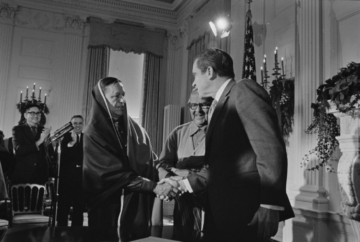by Mark Harvey
“It is certain, in any case, that ignorance, allied with power, is the most ferocious enemy justice can have.” —James Baldwin
The election a couple of weeks ago came as a relief to many of us. It was not a feeling of happily getting back on track again but rather a sense of relief that we hadn’t entirely lost our democracy to shrill lunatics intent on building a bargain-bin version of American fascism. The Republican Party today is unrecognizable even to rock-ribbed Republicans. When someone from the Cheney family threatens to leave the party for its cowardice and extremism, you know you’re dealing with a party that has completely lost its way.
 A Republican used to be someone like Dwight Eisenhower, a moderate who worked well with the opposing party, even meeting weekly with their leadership in the Senate and House. Eisenhower expanded social security benefits and, against the more right-wing elements of his party, appointed Earl Warren to be the Chief Justice of the Supreme Court. Warren, you’ll remember, wrote the majority opinion of Brown v Board of Education, Miranda v Arizona, and Loving v Virginia. If Dwight Eisenhower were alive today, he would be branded a RINO and a communist by his own party. I suspect he would become registered as unaffiliated.
A Republican used to be someone like Dwight Eisenhower, a moderate who worked well with the opposing party, even meeting weekly with their leadership in the Senate and House. Eisenhower expanded social security benefits and, against the more right-wing elements of his party, appointed Earl Warren to be the Chief Justice of the Supreme Court. Warren, you’ll remember, wrote the majority opinion of Brown v Board of Education, Miranda v Arizona, and Loving v Virginia. If Dwight Eisenhower were alive today, he would be branded a RINO and a communist by his own party. I suspect he would become registered as unaffiliated.
For me, the relief came in the form of the repudiation of Lauren Boebert, the congresswoman in Colorado’s deeply red 3rd district where I live. The final results are not in yet, but the margins between her and her Democratic opponent are razor-thin. By any measure, she should have won handily given the unpopularity of Biden here, mid-terms traditionally favoring the party not in the White House, and the gobs of cash she spent.
Her opponent, Adam Frisch, deserves huge credit for running a good campaign and working very hard to visit hundreds of constituents in every county. But for a guy from the town of Aspen to compete the way he did says something about limits: even the reddest voters got tired of the dishonesty and incompetence of Boebert.
I suspect they got tired of her sanctimony despite her decidedly un-Christian ways, her screeching, and her total failure to do anything productive for the district or veterans. To borrow from the writer Anne Lamott, she’s obviously created a God in her own image when that God hates all the same people she does.
I’m hopeful—perhaps prematurely—that the election will allow us to reclaim the country’s narrative. When I say “us,” I’m referring to every American of every party, every color, and every belief thoughtful enough to consider our path from the nation’s founding to where we’ve come today and where we might go. The American narrative, at its best, is a land of freedom, equality, tolerance, and opportunity. Obviously, that narrative is aspirational and many times we’ve failed miserably to live up to it.
We’re all impressionable creatures and no matter how independent we think we are, we’re susceptible to myths and narratives. Myths and narratives are useful as shorthand for how we guide our lives or live as tribes and nations. Far easier to believe an abbreviated version of our history and ethos than to dissect every poor move we’ve made as a people. So we have symbols and totems and condensed stories of our nation to give understanding to what, in reality, is a sometimes confounding past and an anxious future.
Many of our narratives were heavily embellished with moral qualities that often flew in the face of our brutal march to the Pacific. One thing to claim a peaceful thanksgiving dinner with helpful Indians in Massachusetts (as it’s taught in primary schools), all the while living off of corn adorning their sacred burial grounds and spreading smallpox. One thing to flee the oppression of King James only to create an equally oppressive culture of witch burning and black vestures 2,000 miles across an ocean. And even a small notion of freedom and equality for African Americans didn’t come until the end of the civil war. More than two hundred years after Jefferson penned the words, “All men are created equal,” a lot of men—and women—in this country today don’t get treated equally.
And yet we have made progress toward those aspirational words in the Declaration of Independence and the preamble to the Constitution. Despite the witch burning, slavery, genocidal killing of Indians, a colossal abuse of our environment and the ensuing ecocide, there is the possibility of a collective narrative that can sustain us and help us confront all that’s ahead. I’m not talking about white-washing history. I’m talking about coming to terms with our past and, out of that, reforging our national story.
 Considering the filth of our national dialogue today on social media and among politicians, many have concluded that the country is simply beyond redemption. Coming to that conclusion is understandable were it not for a few bright lights and the courage of some of our most abused citizens from the past. A good starting place is with the late James Baldwin, the black author of Notes of a Native Son. If you read Notes of a Native Son, you might find it impossible to believe that Baldwin could ever love America. He grew up in the era before the civil rights movement when black people were still very much living in a Jim Crow nation, and the idea of a black president was absurd. Yet Baldwin never entirely gave up on this country and said, “I love America more than any other country in the world and, exactly for this reason, I insist on the right to criticize her perpetually.”
Considering the filth of our national dialogue today on social media and among politicians, many have concluded that the country is simply beyond redemption. Coming to that conclusion is understandable were it not for a few bright lights and the courage of some of our most abused citizens from the past. A good starting place is with the late James Baldwin, the black author of Notes of a Native Son. If you read Notes of a Native Son, you might find it impossible to believe that Baldwin could ever love America. He grew up in the era before the civil rights movement when black people were still very much living in a Jim Crow nation, and the idea of a black president was absurd. Yet Baldwin never entirely gave up on this country and said, “I love America more than any other country in the world and, exactly for this reason, I insist on the right to criticize her perpetually.”
Baldwin spent a lot of his time considering our story. He wrote,
To accept one’s past – one’s history – is not the same thing as drowning in it; it is learning how to use it. An invented past can never be used; it cracks and crumbles under the pressures of life like clay in a season of drought.
Much of Baldwin’s struggle as a man was to avoid becoming bitter like his father. And the temptation to become bitter was there at every step. He writes of the rage and humiliation he felt at not being served in restaurants because even in states like New Jersey, they didn’t serve “negroes.”
Ironic that for the most privileged among us, we should turn to the words of those most abused to regain our country. If you’ve ever read the searing words of Frederick Douglas, born into slavery, you can grasp how much of our history was at odds with our founding documents. Douglas hated the hypocrisy of 19th-century Americans, both for their claims of equality and of Christian mercy. He wrote,
The man who wields the blood-clotted cowskin during the week fills the pulpit on Sunday, and claims to be a minister of the meek and lowly Jesus. . . . The slave auctioneer’s bell and the church-going bell chime in with each other, and the bitter cries of the heart-broken slave are drowned in the religious shouts of his pious master.
Despite his anger and disgust with the contradictions of 19th-century America, Douglas admired the founding document. He wrote, “…but, interpreted as it ought to be interpreted, the Constitution is a GLORIOUS LIBERTY DOCUMENT. Read its preamble, consider its purposes.” Douglas loathed the hypocrisy in the United States (including the 4th of July for its celebration of freedom when his people were not free) but still fought fiercely for the equality heralded on July 4th, 1776.
It is mind-bending to consider the patriotism—real patriotism, not the “We’re Number One!” jingoistic stuff—that black Americans, American Indians, and Latinos have, and have had, for this country. The eternal fight they’ve waged to change our narrative and realize the aspirations of the founding documents should give pause to those of us raised with more privilege and who haven’t had it so hard.

Watching the career arc of our current secretary of the Interior, Deb Haaland, a Native American woman, is one story that represents our best aspirations and our ability to live up to what we celebrate on July 4th. Haaland, a member of the Laguna Pueblo, was confirmed Secretary of the Interior in March of 2021—the first Indian to ever hold that position. Only 130 years before her confirmation, on a nasty December day on the Pine Ridge Reservation in South Dakota, the US 7th Calvary Regiment massacred 84 men, 44 women, and 18 children of the Lakota tribe at Wounded Knee. The Lakota dead were then buried unceremoniously in a mass grave.
The army subsequently awarded the 7th cavalry soldiers medals of honor. Although Haaland is not a member of the Lakota tribe and although her appointment does not erase what happened at Wounded knee, that an American Indian woman now runs the all-powerful Department of the Interior reinforces Martin Luther King’s words, “…the arc of the moral universe is long, but it bends toward justice.” Incidentally, Wounded Knee is now a National Historic landmark overseen by The Department of the Interior.
Returning to how radically the Republican party has changed and how it has no resemblance to the best qualities of its past, consider—of all people—Richard Nixon. Nixon, reviled for his execution of the Vietnam war and disgraced for the Watergate scandal, nevertheless had genuine compassion for American Indians and their plight and did real bi-partisan work to improve their lives. In a 1970 address to congress, he said,
From the time of their first contact with European settlers, the American Indians have been oppressed and brutalized, deprived of their ancestral lands and denied the opportunity to control their own destiny. Even the Federal programs which are intended to meet their needs have frequently proved to be ineffective and demeaning. But the story of the Indian in America is something more than the record of the white man’s frequent aggression, broken agreements, intermittent remorse and prolonged failure. It is a record also of endurance, of survival, of adaptation and creativity in the face of overwhelming obstacles.

In 1971, Nixon signed the Alaska Native Claims Settlement Act, which parlayed 44 million acres of Alaskan land to Native Americans, along with close to a billion dollars to administer the lands. The act was by far the biggest transference of land by the federal government to Native Americans. What’s remarkable about the legislation is that despite being a hardcore Republican, Nixon worked closely with members of the Democratic party to pass the legislation. It was also a step to turn American aspirations of equality into something real. The eighty years between the Wounded Knee massacre and The Alaska Native Claims Settlement Act is but one person’s lifetime. But the mass grave dug in South Dakota is a world apart from the President of the United States acknowledging the harsh treatment meted out to American Indians and trying to change course.

In an act moving our narrative backward and reminiscent of Nixon’s words about American Indians being “deprived of their ancestral lands,” one of Donald Trump’s first moves in office was to reduce the acreage of Bears Ears National Monument by eighty-five percent. Bears Ears was a 1.3 million-acre monument in Utah designated by the Obama administration. Hopi, Navajo, Ute, and Zuni nations worked for decades to establish the monument, and the land holds thousands of archaeological and sacred sites important to the tribes. Many of us watching Trump carve up the monument had the sense that it was a petty move aimed at diminishing Obama’s legacy. Trump knows nothing about Bears Ears importance to the tribes and nothing of the outdoors.

Part of any country’s narrative has to do with patriotism. But patriotism has many forms. I would submit that the strongest patriots are often the quietest to express their love of country and they do it through civic acts, not by waving giant flags and condemning anyone who dares to criticize the country. Some of the quietest and best patriots are the poll workers who spend long days in Tacoma or Newark or Bar Harbor counting votes at each election. It’s got to be tedious work, poorly paid if paid at all, largely unsung, and fundamentally unsexy. They do it despite the grotesque allegations and insults hurled at them by the election deniers.
Other unsung but vital players in keeping our delicate democracy going are the secretaries of state around the country who weather death threats and demeaning insults as they oversee elections and endeavor to have all legitimate votes counted. Being a secretary of state is somewhat like being the engineer down in a ship’s boiler room. The ship is a functioning democracy and the job of the secretary of state is to keep the engine running despite the idiocy of people like Mike “My Pillow” Lindell.
Those who challenge the legitimacy of every election they lose—no matter their dozens of failed law suits going all the way to the supreme court—are what Thomas Paine called “summer soldiers and sunshine patriots” who would “shrink from the service of their country.”
The recent election doesn’t solve everything. But it’s a start. It’s a repudiation of those who can only be called egregious liars. It’s a repudiation of the worst 2020 election deniers, including Doug Mastriano of Pennsylvania, Jim Marchant of Nevada, Kari Lake and Mark Finchem of Arizona, and Kristina Karamo of Michigan, all of whom lost their own elections. A special wing should be built at Mar-A-Lago with tissues a plenty for these fundamentally dishonest politicians.
This country needs more than one party to keep things in check. We’d be lucky to have a viable third party that could broker the extremes. But cleaving to the lies propagated by some in the Republican party who have nothing to do with Eisenhower’s world view, or even heavily-flawed Nixon’s, does vast harm to America.

The problem of late is that some truly wretched people stole the narrative for a few years. People unlikely to have ever read a damned thing about our history, hijacked the narrative through sheer nastiness, shrill voices, and hundreds of millions of dollars.
On November 8th tens of millions of Americans came to the polls and said NO to the burning down of our democracy. It was heartening to see that of those millions of voters, many were Gen Z, the generation that will hold power down the line. Our country’s situation is still precarious and by no means have we truly corrected course. But there’s hope. Remember the words and brave acts of our most disenfranchised and abused citizens, past and present, and their abiding hope and dreams for this country. They didn’t give up on this country. I haven’t given up on this country. You shouldn’t give up on this country.
